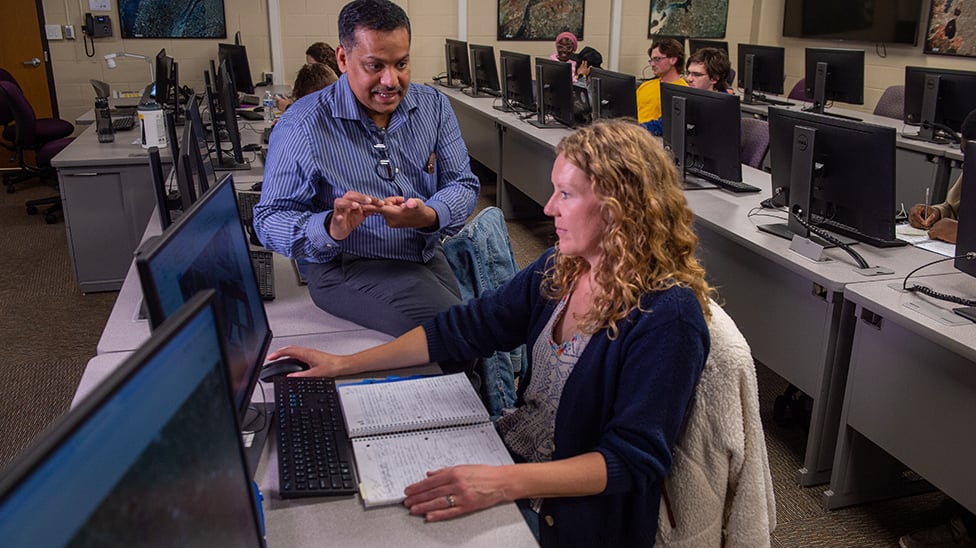
Geography
Geography studies the interactions between people and our environment, and it uses cutting-edge geospatial technologies to solve real-world problems. The program offers in-depth study in environmental and physical geography, which studies weather, climate, soils, rivers, landforms, and natural resources, as well as cultural geography, which explores our society, including development, economy, energy, migration, population, policy, and religion.
Careers in Geography
The Geography program prepares students for careers in diverse fields including cartography, city/regional planning, demography, environmental impact analysis, GIS analysis, land surveying, natural resources conservation, and urban analysis.- Agriculture Analyst/Specialist
- Business/Retail Sales Analyst
- Natural Resource Conservation
- City/Regional Planner
- Community Health Specialist
- Community Organizer
- GIS Technician/Analyst
Potential Salary
Median Salary $90,880
Geography Degrees at MSU
Geography, Bachelor of Arts
The Geography BA degree allows students to examine the relationships between people and the environment, while enabling them to focus more fully on the cultural aspects of the discipline. Students pursuing the major can take a variety of regional courses to enhance their knowledge of world affairs and also become proficient in a language of their choice. Systematic courses in economic, social, urban and rural geographies can broaden their understanding of human spatial systems.
- This program will merge into a new Earth and Geospatial Sciences BS. It is closed for admissions starting fall 2025. Please contact the Admissions Office with any questions (admissions@mnsu.edu).
- Geospatial Science BS remains active and accepting admissions. Advisors will be able to help you select courses that address geography until the new program is in place.
Geography, Bachelor of Science
The Geography BS allows students to study the relationships and interactions between people and our environment, and it prepares them to use cutting-edge geospatial technologies to solve real-world problems. The Geography BS offers broad regional and systematic study related to the environment and people. Environmental and physical geography focuses on weather, climate, soils, rivers, landforms, and natural resources, while cultural geography explores spatial systems related to development, economy, energy, migration, population, health, and religion.
- This program will merge into a new Earth and Geospatial Sciences BS. It is closed for admissions starting fall 2025. Please contact the Admissions Office with any questions (admissions@mnsu.edu).
- Geospatial Science BS remains active and accepting admissions. Advisors will be able to help you select courses that address geography until the new program is in place.
Geography, Minor
Geography is a versatile minor allowing students to develop a basic understanding of the relationships between people and the environment. Students can concentrate on topics such as world regions, environmental processes, cultural systems, or geospatial techniques depending on career goals. A popular option is to complete both the Geography minor and the GIS Certificate so upper-division geospatial electives can double count for both programs.
Geography, Master of Science
The Geography MS provides students an applied learning environment with emphasis on high-impact research and learning experiences. Geography students gain expertise in natural and/or human systems that can be applied to solving real-world problems; quantitative and qualitative field and laboratory methods; geospatial technologies (GIS, GPS, GNSS, Remote Sensing); conducting scientific inquiry; and communicating scientific results/data to the public.
- This program is closed for admissions, effective for fall 2025, and will merge into the Applied Geosciences & Anthropology, MS. Please contact the Graduate Studies Office with any questions, (grad@mnsu.edu).
Geospatial Science, Bachelor of Science
Geospatial Science utilizes digital technologies such as Geographic Information Systems (GIS), remote sensing, and Global Positioning Systems (GPS) to solve geographic problems related to environmental analysis, land use change, urban planning, transportation modeling, geospatial intelligence, and logistics.
Geography, Bachelor of Arts
The Geography BA degree allows students to examine the relationships between people and the environment, while enabling them to focus more fully on the cultural aspects of the discipline. Students pursuing the major can take a variety of regional courses to enhance their knowledge of world affairs and also become proficient in a language of their choice. Systematic courses in economic, social, urban and rural geographies can broaden their understanding of human spatial systems.
- This program will merge into a new Earth and Geospatial Sciences BS. It is closed for admissions starting fall 2025. Please contact the Admissions Office with any questions (admissions@mnsu.edu).
- Geospatial Science BS remains active and accepting admissions. Advisors will be able to help you select courses that address geography until the new program is in place.
Geography, Bachelor of Science
The Geography BS allows students to study the relationships and interactions between people and our environment, and it prepares them to use cutting-edge geospatial technologies to solve real-world problems. The Geography BS offers broad regional and systematic study related to the environment and people. Environmental and physical geography focuses on weather, climate, soils, rivers, landforms, and natural resources, while cultural geography explores spatial systems related to development, economy, energy, migration, population, health, and religion.
- This program will merge into a new Earth and Geospatial Sciences BS. It is closed for admissions starting fall 2025. Please contact the Admissions Office with any questions (admissions@mnsu.edu).
- Geospatial Science BS remains active and accepting admissions. Advisors will be able to help you select courses that address geography until the new program is in place.
Geography, Minor
Geography is a versatile minor allowing students to develop a basic understanding of the relationships between people and the environment. Students can concentrate on topics such as world regions, environmental processes, cultural systems, or geospatial techniques depending on career goals. A popular option is to complete both the Geography minor and the GIS Certificate so upper-division geospatial electives can double count for both programs.
Geography, Master of Science
The Geography MS provides students an applied learning environment with emphasis on high-impact research and learning experiences. Geography students gain expertise in natural and/or human systems that can be applied to solving real-world problems; quantitative and qualitative field and laboratory methods; geospatial technologies (GIS, GPS, GNSS, Remote Sensing); conducting scientific inquiry; and communicating scientific results/data to the public.
- This program is closed for admissions, effective for fall 2025, and will merge into the Applied Geosciences & Anthropology, MS. Please contact the Graduate Studies Office with any questions, (grad@mnsu.edu).
Geospatial Science, Bachelor of Science
Geospatial Science utilizes digital technologies such as Geographic Information Systems (GIS), remote sensing, and Global Positioning Systems (GPS) to solve geographic problems related to environmental analysis, land use change, urban planning, transportation modeling, geospatial intelligence, and logistics.
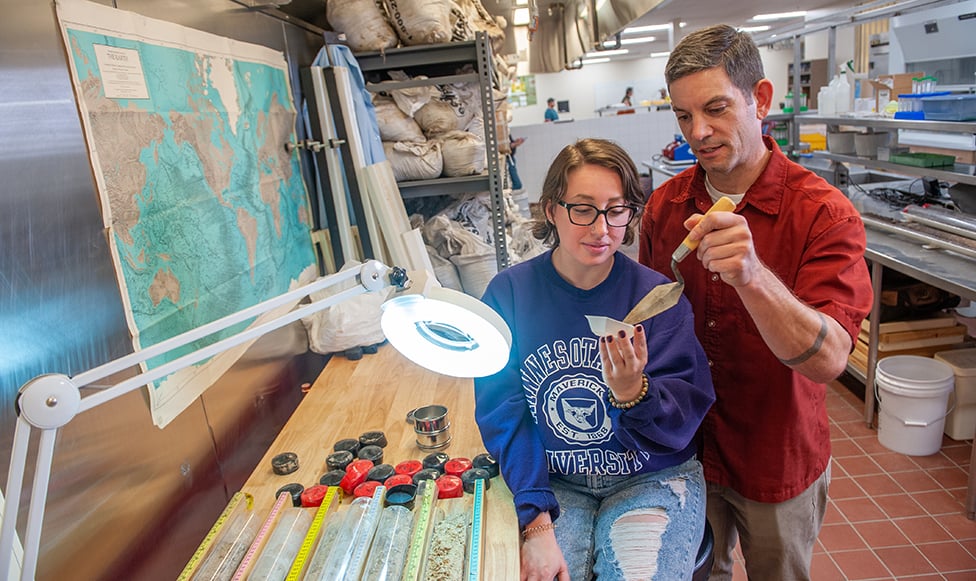
EARTH Systems Lab
An interdisciplinary research and teaching space blending the fields of Geography, Earth Science, Anthropology, and Archeology for innovative scientific research.
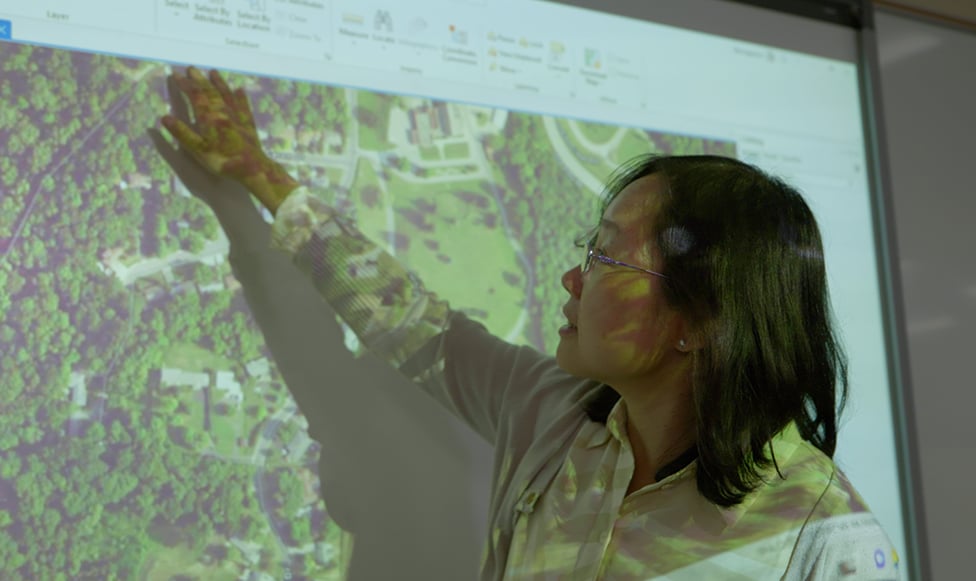
GIS & Cartography Labs
Our GIS facilities feature a GIS lab with 27 high-end computers and a cartography lab with 14 high-end computers, UAVs, and GPS hardware along with complete suites of software featuring ArcGIS and ArcGIS Pro, ENVI, Pix4d, TransCAD, GPS Pathfinder Office, TerraSync, TerraFlex, Trimble Planning, Adobe Creative Suite, and SPSS. The GIS Lab is dedicated to Geographic Information Science (GISc) with emphasis on geospatial and locational analyses and modeling.
Learn More
Archeology, Geography, and Earth Sciences (AGES) Club
The AGES Club offers students in archeology, geography, and earth sciences opportunities for field experiences, training, and networking. We support academic and professional development and welcome all students, regardless of their background or level of interest.
Related Programs
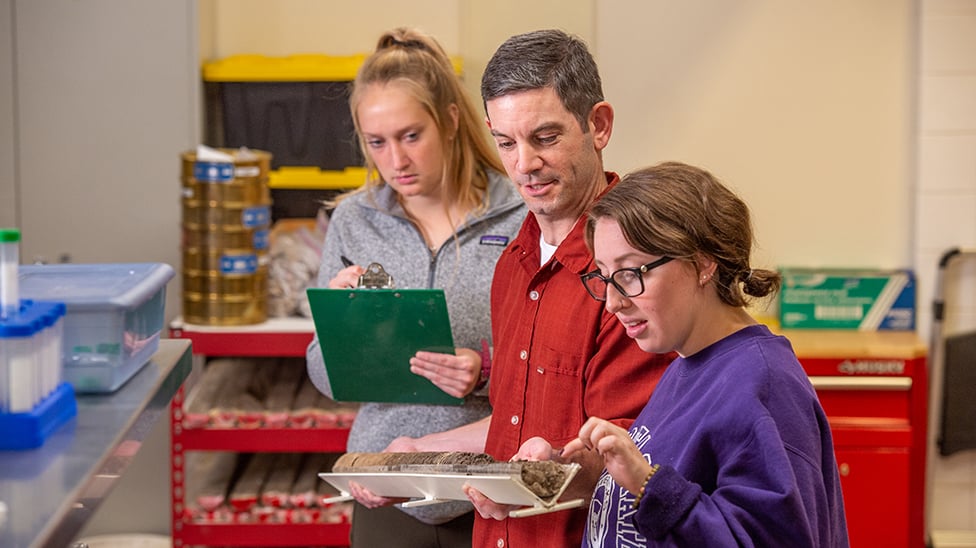
Earth Science
Earth Systems Science is a STEM field that utilizes our understanding of the various interconnected systems on Earth to address major environment problems of our time.
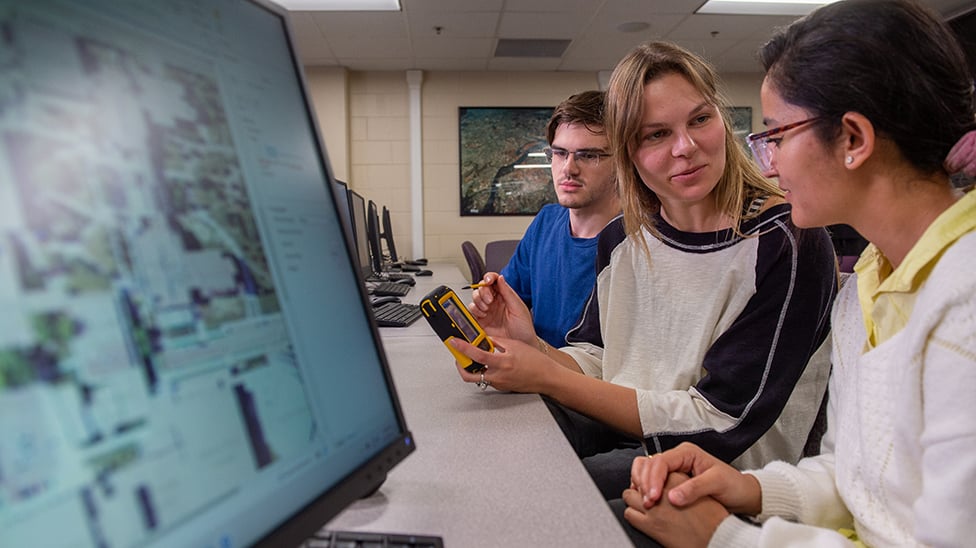
Geographic Information Science (GISc)
The Geographic Information Science program offers comprehensive courses on geographic information systems, remote sensing, GPS and UAV mapping, spatial analysis, geospatial modeling and simulation, web mapping, geodatabase, programming, transportation analysis, and more. Our graduates will enhance their skills and can utilize geospatial technologies to solve real-world problems.
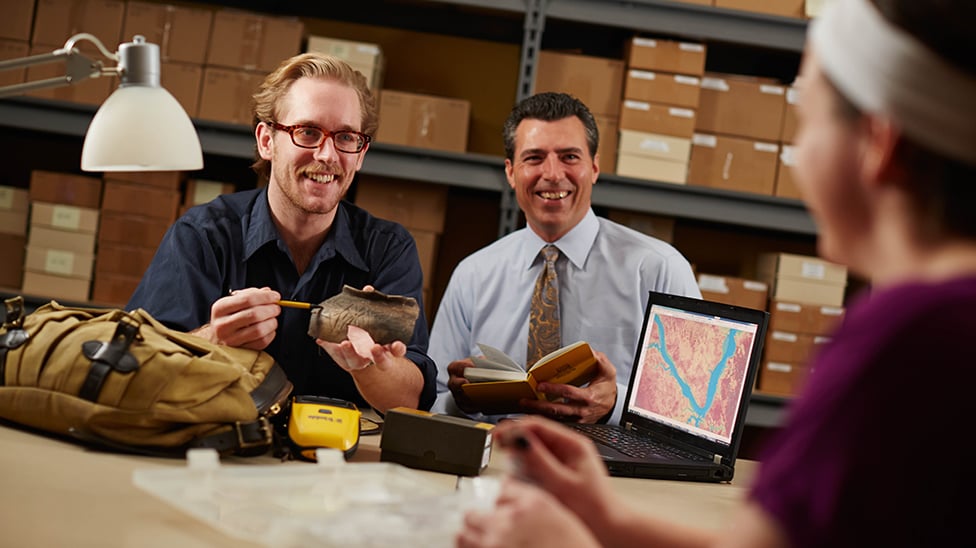
Anthropology
Anthropology explores the interaction of human biology and culture, offering insights through its four subdivisions: archaeology, biological anthropology, linguistic anthropology and cultural anthropology. The major provides training in all areas of anthropology with an interest in global awareness, cultural diversity, human adaptation and an understanding of human behavior.

Environmental Science
Environmental Sciences is an applied science designed to study interactions among biological, chemical and physical components of the environment.
Department of Geography
College of
Humanities and Social Sciences
The College of Humanities and Social Sciences is an inclusive community of diverse learners seeking to examine, engage with and transform the social world while nurturing creativity and innovation. Our programs build a foundation of knowledge that adapts to a constantly changing society.
Learn More About the College of Humanities and Social Sciences
